
- Start
- Double-deckers
- Tuppen
- Munken
- Hjelmen
- Karlhamnsfiolen
- Elvis
- Bulan
- Mohte
- Göteborgsfiolen
- Edvin
- Södling
- Norbergsfiolen
- Spetts
- Toftafiolen
- Bungefiolen
- Hammer
- Lumiere
- Metropol
- Mohte 2
- Jamtlifiolen
- Långalma
- Krokeken
- Antikrundanfiolen
- Angeredsfiolen
- Other swedish understringed fiddles
- Luthiers
- Other instruments with sympathetic strings
- References to violins with sympathetic strings
- Other instruments
- Contemporary fiddles
- Blog
- Origin of sympathetic strings
- Construction guides
- Search picture
- About me
- Bror Strand
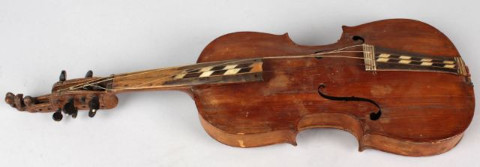
Photo: Bengt Nordqvist
This instrument belongs to the museum Jamtli in Östersund. According to the records it is built by Nils Jonas Ericsson, born 1871 in Sundsjö parish in Jämtland. He moved to Stockholm and later emigrated to the United States where he worked for the Belle Skinner collection of old musical instruments, Holyoke, MT. After the death of Ericsson and Belle Skinner the violin was sent to Jämtland, which was the supposed origin of the instrument. The violin is signed by Ericsson 1920 in Arlington but probably this is done during a renovation of the instrument. I find it nearly impossible that an instrument of this kind is built as late as 1920, it has too many similarities with older instruments.
Head and pegbox is very similar to "Bulan" and these two violins are most likely built by the same person. That person might be Arwit Rönnegren, Johan Georg Mohte or another early luthier in Ängelholm. This violin has also some similarities with Hans Severin Nybergs instruments. If you study the nose on the lions head, it is very similar to the viol that nowadays can be found in Boston and my bet is that this violin as well as the viol is built by Arwit Rönnegren.
Please note the variation of the classic tulip pattern on the tailpiece. The diamonds are placed beside each other without the usual mirrored flipping which result in a somewhat strange pattern.
Arwit Rönnegren
Arwit (also Arved, Arwitt) Rönnegren was born in Halmstad around 1680 and was recruited to the Northern Scanian Cavalry Regiment around 1700 and quite immediately sent to Swedish Pomerania. He participated in battles against Saxony/Poland and also in king Charles XII:s campaign in Russia after which he along with some 20.000 other Swedish soldiers ended up as prisoners of war in Russia. Rönnegren came back to Sweden May 8th 1722 and had probably learned violin making in captivity along with his friend Johan Georg Mothe. Rönnegren continued to work in the army, despite being injured during the war, and built instrument as a side business. "Arwit Rönnegren i Katarp i Lugede Herat anno 1737" is written in one of his violins. Rönnegrens wife Anna Gabrielsdotter was 22 years older than Arwit but both of them died in 1737 when Anna was 79 and Arwit 57. Despite this, Arwit managed to remarry after the death of Anna, and had a son with 31 year old Hanna Ingemansdotter. However Arwit died before Hanna gave birth to Arfved Arvedson 19th of May 1738.
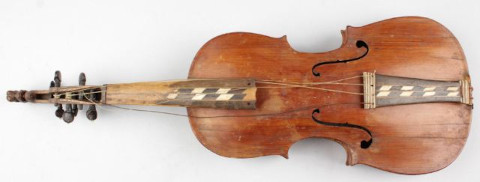
Photo: Bengt Nordqvist
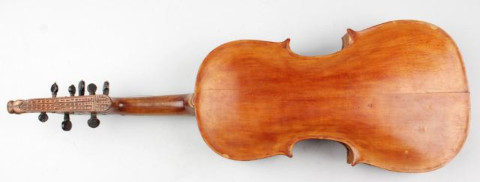
Photo: Bengt Nordqvist
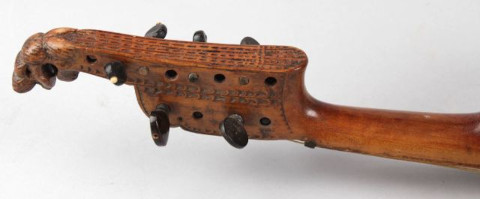
Photo: Bengt Nordqvist
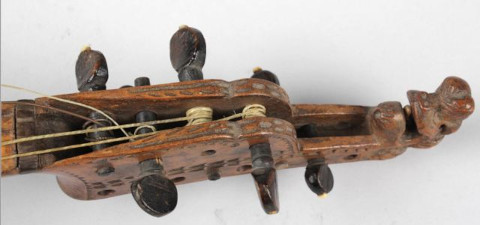
Photo: Bengt Nordqvist
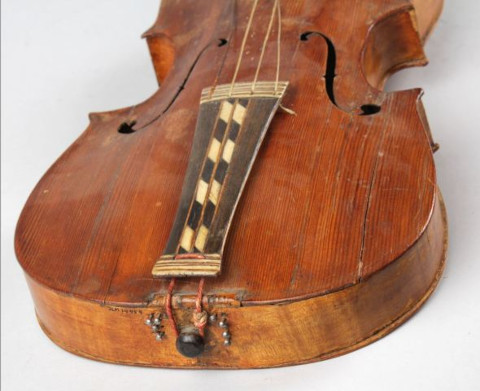
Photo: Bengt Nordqvist
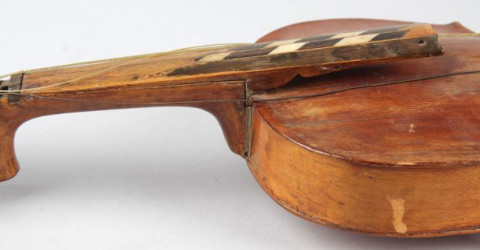
Photo: Bengt Nordqvist
| Name | Jamtlifiolen |
| Type | Double-decker |
| Luthier | Arwit Rönnegren |
| Year | |
| Origin | Kattarp, Skåne |
| Found in | Jamtli, Östersund, Jämtland |
| Playing strings | 4 |
| Sympathetic strings | 8 |
| Total length | 627 mm |
| Scale length | |
| Length of corpus | 357 mm |
| Height | |
| Rib height | 33 mm |
| Other instruments built by Arwit Rönnegren | BulanBostongambanKulturenfiolenArwitgamban M285 |
| Other instruments with the same number of sympathetic strings | TuppenMunkenHjelmenKarlhamnsfiolenElvisBulanMohteGöteborgsfiolenEdvinSödlingNorbergsfiolenHammerMohte 2AntikrundanfiolenAngeredsfiolen |
| Other instruments with tulip intarsia | TuppenKarlhamnsfiolenSpele-JockeDubbeltulpanenTrippeltulpanenKulturengamban |
| Other instruments with a lion head | TuppenKarlhamnsfiolenElvisBulanGöteborgsfiolenEdvinSödlingTielkegamban M2475BostongambanKulturenfiolenArwitgamban M285DubbeltulpanenTrippeltulpanenKulturencellonKulturengambanAntikrundanfiolenAngeredsfiolen |